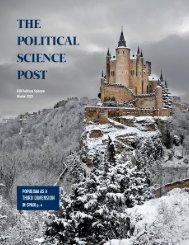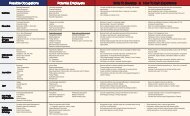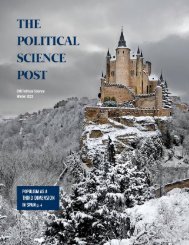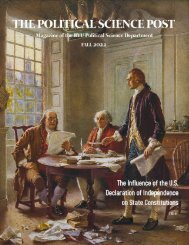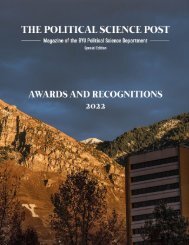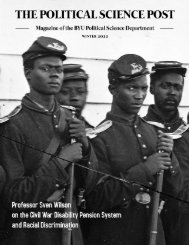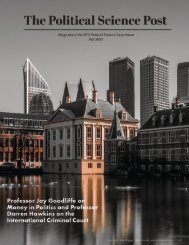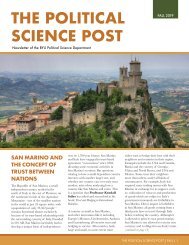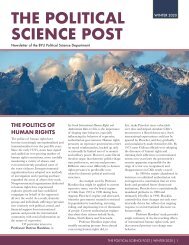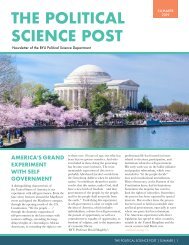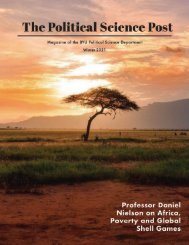You also want an ePaper? Increase the reach of your titles
YUMPU automatically turns print PDFs into web optimized ePapers that Google loves.
1
THE SYAHIM MAG
FOREWORD
SPECIAL ISSUE
Students, colleagues and friends around the globe are
mourning the tragic loss of Professor Wade Jacoby, who
passed away without warning on Saturday, February
29, 2020. At the time of his death, Wade was mountain
biking on a trail east of St. George, Utah, in Hurricane—
one of his many, many passions—with close friends
and colleagues at the university. Wade has an extensive
network of relationships, and we know that hundreds,
even thousands, are mourning this great loss.
Wade Jacoby was an accomplished scholar and stands
among the most visible comparative political economists
studying Germany specifically and the European Union
expansion to Eastern Europe more generally. His two
sole-authored books, Imitation and Politics (Cornell
University Press, 2001) and The Enlargement of the
European Union and NATO (Cambridge University,
2006) are both widely cited and seen as significant
contributions to his fields. In both books he demonstrated
how institutions and standards from abroad were
mimicked in post-Fascist or post-Communist polities
successfully when replicating function but unsuccessfully
when rigidly applied.
A 2006 review article in World Politics, one of the leading
journals in political science, “Inspiration, Coalition,
and Substitution,” guided an emerging literature on
how external actors can create informal coalitions with
domestic leaders in cementing commitments to policy
reform. His remarkably creative 2006 Cambridge edited
volume chapter, “How Agents Matter,” co-authored with
his BYU colleague, Darren Hawkins, helped to launch
the application of principle-agent theory to international
relations as it critiqued it, and it remains a standard
reference in the literature. He published scores of other
notable journal articles and edited volume chapters
across a remarkably interdisciplinary range of fields
including political science, economics, sociology, public
policy, and law.
Wade was a beloved teacher at Brigham Young University
and, before that, at Grinnell College. He had rare and
enviable gifts as a communicator and teacher. Students
were enthralled by his vast knowledge, his elocution and
his wit. He could spin a tale with this best of them while
focused on important concepts his students needed to
learn. He had a gift of constructing witty and insightful
metaphors that would bring home the essence of
challenging concepts. Wade was particularly passionate
about helping students become effective writers and
encouraging his peers to teach writing more effectively.
He was very demanding, with high expectations, and
did not accept sloppy thinking or writing. But students
also knew that he cared deeply about them. He was
fully invested in their learning and in their lives.
Beyond his influential scholarship and teaching, Wade
Jacoby was known as the least nerdy political scientist.
In high school during the 1980s, he was a standout
athlete in baseball, football, and basketball in the
state of Washington. Though he attended BYU as an
undergraduate on an academic scholarship, he was a
backup infielder for the Cougars and also walked onto
the football team as a receiver. After graduation and
before his PhD studies at the Massachusetts Institute
of Technology, he quarterbacked the Bonn Jets to the
German national championship in American-rules
football. He was an accomplished bow hunter and fly
fisherman and loved many other outdoor activities
including mountain biking, hiking, and canyoneering.
He and his wife, Kindra, raised three exceptional
daughters, Taylor, Clementine, and Kendall. He was
devoted to Kindra and his children and quick to relay
the accomplishments of his daughters and sons-in-law,
Kurt Hepler and Josh Essex, and to repeat the latest
precocious utterings of his beloved granddaughter,
Beatrix.
Wade once commented in a faculty meeting that we
should put out a faculty job posting saying, “The Political
Science Department seeks small acorns who aspire
to be great oaks.” This typically pithy and charming
comment delighted his colleagues and was neither the
first nor last time he would fill our conference room with
laughter and insight. For so many of us, Wade Jacoby
was that great oak. He grew into that role with intention
and intensity. We do not know what to do and say in the
dark shadows of this loss, but we are keenly aware that
Wade would know what to say and how to say it. We are
comforted by our hope and faith that one day we will
again see his wry smile and feel his warmth and love.
2
1
SVEN WILSON AND DANIEL NIELSON
3
THE SYAHIM MAG
CONTENTS
GRADUATION 2020 EDITION
FOREWORD 1
STUDENT AND FACULTY TRIBUTES 5
WADE JACOBY INSPIRING LEARNING
FUND 14
A TRIBUTE TO WADE JACOBY 15
FACULTY IN THE NEWS 17
WADE'S FACULTY PUBLICATIONS 20
FACULTY QUOTE 21
Publisher:
Sven Wilson, Chair
Editor:
J. Matthew Clarke
Graphic Designer:
Sydney Freeman
4
3
5
FROM BYU FHSS COLLEGE
FACEBOOK PAGE
6TRIBUTES TO
WADE
5
"I took three classes from
Professor Jacoby and worked
with him as a research assistant.
It was a joy and pleasure to
learn from him and just be
around him. He was brilliant,
dynamic, engaging, and wise.
And even more impressive to
me was that he was kind, loving,
humble, and sincere. He really
cared about me and my fellow
students. He taught me a great
deal about political science
and in addition to that he taught me how to be "robot proof" and more cognizant of gender
issues in the workplace. He helped me become a better person. I will forever be grateful to
him and will miss him dearly.” -Jacoby Remington
"I just learned of Professor Jacoby's death. He probably would have never remembered me
from the countless students he taught, but I will never forget how he challenged my thinking
as a young, arrogant returned missionary from Switzerland and France who thought he
knew everything about Europe. Two instances stand out in my memory - a visit during office
hours and another the mark of his red pen on an essay - at times when I fundamentally had
to change my perspective and admit that I had not fully challenged my thinking. At a time
in my life when I was just trying to get the grade and move on, Professor Jacoby taught me
humility and higher thought. I don't remember a lot from my undergrad academics, but I
remember those moments vividly. Thank you, professor." -Andrew Nelson
"I took my first political science class at BYU from Professor Jacoby. It was so hard for
me, but I learned so much and by the end, I loved it. He had this amazing ability to
inspire learning and make it fun. He am so happy I got to know and learn from him.
He will not be forgotten." -Alison
Fong
"I had known Wade for several
years, never intensively, we never
had dinner together or so, but we
met in many conferences in the
US and Europe and it was always
amazing to read and discuss his
work and enjoy his warmth not
only as a scholar but also as a
person. His insights on Germany
and the EU were amazing and
his interest in other people's work
really genuine. His loss is yet
another example that the best and kindest go first. RIP mein lieber Wade! DEP."
" So many from our Washington Seminar
group are shocked and sad with this loss.
I remember how much fun he was as our
leader and guide during that time. But
beyond the fun and the jokes, he also pushed
us to challenge ourselves--to think critically,
to ask questions, to learn, and to grow. He
taught us to always ask, "How does that
work?" And it is thanks to that question and
his influence that I found the curiosity and
direction I needed to pursue a PhD.
The world needs people like Prof. Jacoby who
will encourage, enable, inspire, and guide.
And just as much as this is an incredible loss
for the world in that way, my heart aches
most for his lovely family members -- Taylor
and Kurt, Clementine, Kendall, and Kindra.
I cannot imagine the depth of this loss for
you, and I wish all of the love and care and
peace for you." -Anna McKean
FROM BYU FHSS COLLEGE
FACEBOOK PAGE
ISSUE
31
TRIBUTES TO
WADE
7
"It was in 2010 when I attended APSA in Washington, DC. I was a shy and insecure
graduate student and I went to a panel with senior scholars, where Professor Jacoby served
as a discussant to the papers presented. I asked a question of one of the presenters (a
senior European scholar), who did not like my question. After the panel ended, Professor
Jacoby approached me and said that I asked a very good question and that the ideas that
I shared were true and I should not be discouraged. I remember to this day the feeling of
empowerment and trust that he transmitted to me - every time I ask questions which are
answered in unkind ways, I always remember him and his advice. Professor Jacoby touched
many lives, he sensed the insecurity and the fear, but he found the right words to calm,
empower and motivate. Thank you, Professor Jacoby. I did not meet him ever after, but cited
his work in my research and will always remember his example in my own work with students.
Rest in Peace." -Ecaterina Locoman
"Very fond memories of your family from your time with the BYU Study Abroad Program in
London. We have shared the sad news over here. Unsure what happened but Wade was taken
from us far too soon. Our Father in Heaven must need him badly." -Steve Edwards
"Professor Jacoby taught me how to write well. He was incredibly patient with me as I made
mistake after mistake. He always made time to read my writing even when I wasn't enrolled
in one of his classes. He was a caring mentor to me, and I will never forget the profound
influence he had on my time at BYU. I find it hard to believe that he is no longer here. We've
lost a caring and dedicated teacher, friend, and mentor. I pray for his family and friends
that they will be comforted and know that even though he isn't here, Professor Jacoby is not
forgotten." -Margaret Jarvis
6
THE SYAHIM MAG
THE SYAHIM MAG
Student and Faculty Thoughts on Wade Jacoby at
the Student Memorial Service, March 5, 2020, in the
Joseph F. Smith Building at BYU
"The last two years we’ve been neighbors and he helped raise my children. He was pretty
good at being neutral with students about politics, but he was a bit of a progressive. In our
neighborhood not everyone is progressive although many are, and there was a man on the
end of our street, a lovely man, but an arch conservative. And sometime in the 2010s Wade
heard this man’s comment about politics. You’ll never guess what he said. Wade said the man
said “The country will never be whole again until there is a military coup to replace Barack
Obama.” And the man said he would join it. And Wade called on him for hours with his
wife, to talk. And he loved this man, even though he disagreed with this man as much as you
can disagree. Its emblematic of Wade. Wade contested the culture of contempt in American
politics and he did so many things to get over the empathy wall and love people, and love those
with whom he disagreed, and he never wanted to change their views, and he wasn’t going to
change his view, but his view was that we love. We love everyone."
-Dr. Daniel Neilson
7
8
"I wasn’t exactly happy at school, my freshman year, and I felt like I didn’t have any friends,
and I took advantage of the opportunity and to take advantage of the fact that there are
people paid to listen to me. To hang out with me. The very first week I went to professor
Jacoby’s office hours. And just sitting with him because I was so desperate to have a friend.
And that day he just sat with me and he talked with me about my home and about the things
that I missed and what I was excited for in college. And I left that very first day feeling just a
little bit better. About being in a place that I didn’t know, because I knew that professor Jacoby
who had so many other students and so many other things on his plate, that he was there for
me even when he was busy. He was going to put time and effort into me because that’s just the
person that he was. I ended up visiting him every single week that semester. And I don’t know
if he knew this, but he was one of my best friends. Which is a little bit nerdy, but I loved him
and I knew that he loved me even though I was just one of his students. I am so grateful that I
had the chance to know him. Even if it was only for a short time. Thank you. "
-Girl Student
"I just worshipped the guy. Every word that came out of his mouth was a note in my notebook.
Everything he said I wanted to understand what the heck he was talking about.
Whether it was economics or politics. And that was three years ago. And I’ve been into his
office so many times looking for advice and he’s been such a friend to me. One short story,
is that I knew him through the model EU and we went to Seattle three years ago, and at the
time I was living in Heritage Halls, and I was sitting in the airport, and he said “Hey, Adrian,
do you want a ride home?” and so he drove me home from the airport in Salt Lake. And the
whole way home I was scared out of my mind first to say anything, and second to admit that I
lived at Heritage Halls, and he started roasting Donald Trump, and I finally felt comfortable,
and the moment came for him to drop me off, and he said: “Let me drop you off,” and I said
“You can just drop me off by the Creamery, no big deal.” And he was like, “Adrian, do you
live at Heritage?” and I said “Yeah, Dr Jacoby, I live at Heritage.” And he said: “That’s great,
I’ll drop you off up there, no problem.” He could tell I was so embarrassed. And he would
bring that up to me throughout the semester. My point is that he was so personable. And so
kind, and despite the fact that he had this intimidating factor about him, he used that to build
student’s confidence. And I still feel today that I’m a capable student, I’m a capable person, I
can believe in myself, because Wade Jacoby liked me." -Guy Student
FROM STUDENT MEMORIAL
SERVICE ON MARCH 5, 2020
ISSUE
31
STUDENT AND
FACULTY THOUGHTS
9
"He used to ask, what’s the measure of a good life. And the easiest thing is to leave the world
a better place. And I think everyone in the room would struggle to even put into words how
well Wade Jacoby did that. But I think he went even a step further than that. I think that so
much of Wade Jacoby lives in probably everybody here, and everybody he touched. All the
TAs I worked for I told Hailey
the other day that I think Abby is
Wade Jacoby junior. And I think
even though he himself is gone,
and I know that we want to have
him back, and I know that a lot
of him still lives within each of
us, and I know I’m still going to
be frantically checking all my
papers in Grammerly, to see if
it would have lived up to Wade
Jacoby’s standards."
-Guy Student
"I did not care at all about
my grade in his class, I just
desperately wanted to be Wade
Jacoby’s friend. So Bad. And so
all my Poli 150 friends decided to
8
THE SYAHIM MAG
FROM STUDENT MEMORIAL
THE SERVICE SYAHIM ON MARCH MAG 5, 2020
STUDENT AND
FACULTY THOUGHTS
go to the October Fest that was
planned going on last semester,
and we showed up and there
were all these intellectual
people there and we were just
taking these root beer shots
and playing pool. And like, I
felt so cool. It’s a party. And
when professor Jacoby walked
in, I was like, it’s professor
Jacoby I want to go talk to
him. But we were so scared
because he is like, so amazing,
so we legitimately followed him
around for like 15 minutes,
trying to figure out how we were
going to talk to him. I said, you
go talk to him, no I’ll go talk to
him, no I can’t do it. And so we finally just ended up talking to him, we walked down, and he
just right off the bat, was super personable, and I don’t think I’ve ever had a conversation with
him before that, but he knew my name, which is a huge thing for me, because I was really quiet
in that class and I didn’t think anyone knew my name. and so we were talking with him and
he said “I want you guys to know, you make an awesome contribution to this class and is there
anything else I can do to be better?” And I was shocked because I didn’t think anyone could
be better than Dr. Jacoby. And so, one last thing, he came and talked to our model EU team,
and he remembered my name even two months after I finished his course. So he had a massive
impact on my life, he made me realize that I could get better and I needed to get better,
because we can all be better, but still I had worth, and he remembered who I was. That was a
huge thing for me and I think I will always treasure the impact he had on my life.”
-Girl Student
9
10
"I thought I would give a perspective on who he was outside the classroom. And this Awe you
guys are describing it happens with grown men, and everybody who ever came within his orbit,
wanted to be liked by him. So, that’s totally normal. And you can imagine that in a Ward, I’ve
lived in his Ward for the past 17 years, and I have a son, and Wade was like the stealth agent
for kids who maybe needed a little extra help. Because as you can tell, that’s actually the most
dressed up I’ve ever seen him. I don’t know if he ever wore a tie to church. Maybe once in a
while. He didn’t ever come across to the youth as a guy that was going to throw the Book of
Mormon or the Bible at them, instead he was going to give them a fishing rod to help them,
and so one day he called me and we had a secret code among those who owned a kayak, that
they could borrow a kayak from the others, and I own a tandem kayak and he owned a couple
of singles, and he heard that the White Bass were doing something to make them catchable,
and I am experienced fly fisherman, and I was often rubbing it in that I was much better at
it than he was, or at least he was always commenting on the fact that he didn’t catch enough,
but I didn’t know anything about lake fishing. And I said yea, I’d like to learn a bit, and so we
went down to the lake and I brought my kayaks and I brought my son. Because I thought, I
want my son to have a chance to interact with Wade Jacoby, I didn’t think my son was going
to be, and I didn’t anticipate how enamored my son was going to become of Wade, almost
to the point of jealousy. As we got to the parking lot and we were deciding who was going to
be with whom, I was assuming Sam, my son, was going to go in tandem with his father, and
he said, can I go with Wade? I said, “yeah, yeah sure, go with Wade.” So he goes off with
my son, and because he knew about this White Bass hatch or whatever it was, going on, he
was literally like Jesus had told them where to cast their nets and they were pulling out 40-50
fish by the time they were done, and I caught zero. And my son was just, you know, he just
kind of locked in at that moment, like Wade Jacoby is like the coolest human being on the
planet. He is way cooler than my dad. And I thought I was going to feel jealous, but I loved
this man, so I was certainly very happy (tears), but to make matters worse, he brings us back
to his house, and these are small fish, and he knows how to fillet these tiny fish, into these tiny
fillets, it’s a real art, and then he has like three different dips, to baste the fish in before we
were going to fry them, and my son is learning all this skill from him, and I’m like, I’m done
for at this point, and we’re eating these things as we’re cooking them, and we just ate until we
were absolutely stuffed and from that moment forward I just knew that something magical
had happened to my son. That was the kind of impact he had on everyone. And he knew that
he had that impact on people, it’s not like he did it out of a kind of arrogance, but whenever
anyone approached him with their children, needing something, he knew he could do some
good. And, he was a tremendous father, and tremendous surrogate father to many others. I
hope that gives a picture a little bit more of his domestic and spiritual life because for him,
that was spiritual work.
- Dr George Handley
FROM STUDENT MEMORIAL
SERVICE ON MARCH 5, 2020
STUDENT AND
FACULTY THOUGHTS
"He never detracted from Poli Sci no matter how hard the readings were. And I still don’t
know who DesCartes is or anything about it, and I still don’t understand, but it didn’t
matter, because you felt there was something special about politics and there was something
important to be learned, and that’s what mattered most for many of us. But one story he
shared, in Poli 150: He was raking leaves one day, for someone, on a service project, and one
of his leaders came up to him and said: “Do you like raking leaves?” and he “Sure!” and
thought he was about to be complemented, and he was all excited, doing good, and the leader
said: “But you know that that’s not true service. That’s not true compassion. True compassion
is getting proximate, it’s uncomfortable, it’s getting close to people who are different than you,
and to do things that are hard and out of your comfort zone.” And on my mission I thought
about that almost every week. When I got back and I saw him on campus and he waved to
me, and I was star struck at that moment, because he remembered me, and I told him that
what he told me in that class meant so much for me, and meant a lot, and I’m really glad you
took the time to say that. Even though it was a little intimidating. And one more thing, last
January, I was out of the country for an internship, and I got an email from Dr. Hawkins,
saying “Hey, you never finished filling out your application for this fellowship, are you going
to?” and I was sort in the middle of other things, and I said sure, and I sent in like two halfhearted
sentences saying sure I’ll finish my application, and he immediately responded and
said: “Great, because Jacoby really wanted you.” And later when I talked to Wade again he
said: “I really wanted you because you ask great questions, and I appreciate that.” And that
meant the world to me. I thought, oh good, I don’t have to know a lot of things, because I
don’t, but to ask good questions. That’s all I need to do. And he always inspired all of us."
- Girl Student
11
10
ISSUE
31
MY SOUND
13
THE SYAHIM MAG
12
MY SOUND
14
14
ISSUE
31
MY SOUND
THE WADE JACOBY
INSPIRING
LEARNING FUND
15
Dear Colleagues, Students, and Friends of Wade Jacoby:
Generous donors to BYU have provided us with funds to
honor the memory of our wonderful colleague Wade Jacoby.
Those who want to join us in honoring Professor Jacoby
can donate to the "Wade Jacoby Inspiring Learning Fund,"
which will begin immediately to provide financial support to
undergraduates at BYU.
If you wish to donate, you can send a check to the Political
Science Department (c/of Krista Mortenson, 745 KMBL,
BYU, Provo, UT, 84602) or you can go to this website:
https://tinyurl.com/y4hpll5j
[Instructions: In the search box, choose, "Select other funds"
and then choose “FHSS - Political Science – BYU.” Lower
on that page, select “In memory/In honor of ” box and write
in “Wade Jacoby” or leave a comment at that same location.]
Thank you very much in advance for supporting this effort.
We share with you the grief you are feeling at Wade's passing.
{
Send a check to:
Krista Mortenson
745 KMBL, BYU
Provo, UT 84602
or donate online
https://tinyurl.com/y4hpll5j
THE SYAHIM MAG
14
BY DARREN HAWKINS
AT THE FFHSS ANNUAL
CONFERENCE
A TRIBUTE TO
WADE
Six months ago this Saturday, I was riding a mountain bike with my dear friend,
Wade Jacoby, when he suddenly hit the ground hard and, we learned later,
was more or less instantly gone. We worked on him for 45 minutes while a rescue
helicopter arrived. I had hope the whole time, but my hope did not bear fruit.
Where did I find such hope? Wade himself was one likely source. When Wade looked
at the world, he saw gross inequality, stubborn racism, the abuse of power and deep
suffering. What was Wade’s reaction to this dismal scene? I offer one small example of
his many efforts. Wade held an annual MLK Day gathering of friends and family to
honor the most under-celebrated holiday in America, as he called it. He ensured we
did not just eat, drink and socialize, but we also gathered for 30 minutes of thoughtful
poetry and prose to better understand injustice. Then Wade would distribute an
important recent book on inequality that he purchased for everyone present.
That was Wade in a nutshell: Fighting inequality through intelligent and friendshiporiented
consciousness-raising and action. Yes, he was a distinguished scholar with
many publications; he was frequently traveling because he was such an entertaining
and insightful speaker; and when his colleagues around the world learned of his
passing they insisted that we would soon hold a
conference in his honor at BYU. We will do so as
soon as we are able, and we expect dozens of the
most eminent European scholars to attend and to
praise him.
16
15
But that is only one part of the Wade I knew. I
knew a fellow mountain biking, canyoneering,
and midnight snowshoeing near a lonely yurt
in the Uinta mountains adventure partner. I
knew a teacher who was passionate about his
students and who demanded the very best from
them. I knew a human being who was always
deeply interested in my and my family’s wellbeing.
I knew a debate partner who always won
by weaving folksy cultural references into a
compelling story that would leave you gasping
and wondering: How does he do that?! Does he really just make that up on the spot?
Allow me to illustrate. When Wade wished to take on one of the most deeply
entrenched theoretical approaches in the social sciences—principal-agent (or PA)
theory—he did so by writing two of the most inventive paragraphs ever published in a
Cambridge University Press book. For the uninitiated, when you think of a principal,
think of a boss; an agent is the employee.
In those paragraphs, Wade both introduced the argument and convinced his readers
that he was right: Scholars had not considered the variation in agent strategies and in
failing to do so, they had overlooked an essential factor. To make the argument, Wade
asked us to compare Forrest Gump, George Castanza of Seinfeld, and the Man with
No Name, played by Clint Eastwood in celebrated films. Who could possibly ever
come up with that comparison? Only Wade.
Forrest was the perfect agent, doing whatever his superior wished. Castanza was, in
Wade’s memorable words: “marginally competent, and always on the take. Principals
do get some work out of this kind of agent -- otherwise they would terminate the
contract -- but it’s always a close call on whether the costs outweigh the benefits.” And
the Man with No Name was a nightmare, hiring himself out to two warring families at
the same time and playing them off each other to maximize his profits.
To anyone wondering whether agent strategies mattered, there is no need to read the
rest of the article. Case opened, stated, and closed in two unforgettable paragraphs.
But there is yet another dimension of Wade, that of a humble person of faith. I wish
to close with his own words, as good writing mattered a lot to Wade and he was a
master. In stake conference a few years ago, Wade was asked to explain why he joined
the church and why he stayed. He told of joining because of a scoutmaster who took
a strong interest in him, driving far out of his way to pick up Wade for activities, and
how what scoutmaster re-molded him.
BY DARREN HAWKINS
AT THE FFHSS ANNUAL
CONFERENCE
ISSUE
31
A TRIBUTE TO
WADE
17
In Wade’s words:
“Though I now had better self esteem, a better understanding of what a kid
was worth, I still had no clear idea how a life should be lived. I recognized my
weaknesses…but had no clue how to fix them.
I also saw that I was still capable of hurting others. My own efforts to diagnose,
let alone fix, my shortcomings never seemed to work very well. I wondered and
doubted whether there was a way out. This is where the Atonement came in. I
came to see the Atonement as a kind of mysterious act that I did not understand
but I knew could work.”
Wade then discussed how the Atonement was his best chance to meaningfully turn to
others. In his words again, “This church didn’t just give me a way to the Atonement,
but it taught me a hundred practical things to do to help other people get there too.
Could [we and] the Church do better? Yeah, we’re good at serving one another, but
we have lots to learn about serving the truly needy. We should be more horizontally
ecumenical in our service across religions and more vertically focused on our poorest
neighbors, as this increasingly brutal economy wears down hard working people of
faith, of damaged faith, and of no faith at all. Still, there’s nowhere I can learn these
lessons better than here. So, returning finally to the Stake Presidency’s question to me
about why I felt invited and why I stayed, I guess you might say that I came for the
camping and stayed for the Atonement.”
Wade, we all now desperately want to “be more horizontally ecumenical in our service
across religions and more vertically focused on our poorest neighbors.”We thank you
for showing us how to do this. We love you and miss you.
-Darren Hawkins
THE SYAHIM MAG
16
FACULTY IN THE NEWS
MONDAY, FEBRUARY 3RD, 2020
ON TOP OF MIND
Wade Jacoby and Joel Selway, you were both great on Top of Mind talking
Brexit today. They address how Britain finally left the European Union.
But actually, the curtain hasn’t quite yet gone up on an independent UK.
It’s more like dress rehearsals have begun and opening night is still almost
a year away Thank you for taking the time!
Listen here: https://tinyurl.com/y28zsk7t
WEDNESDAY, OCTOBER 30TH, 2019
ON TOP OF MIND
Well, Britian's departure from the European Union has been delayed
again. Wade Jacoby discusses if Brexit is ever going to actually happen.:
Listen here: https://tinyurl.com/y269wcc7
18
17
WEDNESDAY, MARCH 20TH, 2019
ON TOP OF MIND
More discussion about Brexit with Wade Jacoby. Listen here:
https://tinyurl.com/y2zfkzfo
FRIDAY, JULY 28TH, 2017
ON TOP OF MIND
Do you know when and why the European Union was formed? Most of us
are probably a little fuzzy, to be honest. We’re going to get some answers
from two experts of European politics, one being Wade Jacoby.
Listen here: https://tinyurl.com/y3zfrdu6
TUESDAY, JUNE 6TH, 2017
ON TOP OF MIND
Trump went against all of Europe, and the rest of the world, by pulling the
US out of the Paris Climate Accord. Are transatlantic relations at a record
low? Listen here: https://tinyurl.com/yyptbo9d
ISSUE
31
19
THE SYAHIM MAG
18
20
19
THE ENLARGEMENT OF THE
EUROPEAN UNION AND NATO
ORDERING FROM THE MENU IN CENTRAL EUROPE
In 2004 the European Union and NATO each added ten new member
states, most from the post-communist countries of Eastern and Central
Europe. In order to prepare for membership, these countries had to make
many thousands of institutional and legal adjustments. Indeed, they
often tried to modernize in just a few years, implementing practices that
evolved over many decades in Western Europe. This book emphasizes the
way that policy elites in Central and Eastern Europe often 'ordered from
the menu' of established Western practices. When did this emulation of
Western practices succeed and when did it result in a fiasco? Professor
Jacoby examines empirical cases in agriculture, regional policy, consumer
protection, health care, civilian control of the military, and military
professionalism from Hungary, the Czech Republic, Poland, Bulgaria, and
the Ukraine.
IMITATION AND POLITICS
REDESIGNING MODERN GERMANY
Following World War II, a poorly funded, piecemeal effort to transfer British
and American institutions into West Germany resulted in many positive
changes for that nation's citizens. After reunification, however, a more
ambitious, well-funded, and systematic effort to establish West German
institutions in the former GDR has been less effective. Through a close
analysis of these two cases, Wade Jacoby explores the conditions under
which one society can serve as a model for the reshaping of another.
In the initial transfer, Jacoby finds, Allied occupying forces sought to build
institutions in Germany that were the functional equivalents of ones they
valued at home. They encouraged the development of selected German
organizations that became co-architects of the postwar society. Several
decades later, by contrast, policymakers in Bonn used exact rather than
functional imitation, and they ignored regional interests when redesigning
East German society. For both cases, Jacoby focuses on attempts to reform
industrial relations and secondary education. For innovations to be "pulled
in" from abroad, Jacoby argues, local civic groups must participate in and
benefit from the institution-building process.
ISSUE
31
FACULTY PUBLICATIONS
21
WORLD POLITICS
A QUARTERLY JOURNAL OF INTERNATIONAL RELATIONS
A 2006 review article in World Politics, one of the leading journals in
political science, “Inspiration, Coalition, and Substitution,” by Wade, guided
an emerging literature on how external actors can create informal coalitions
with domestic leaders in cementing commitments to policy reform. His
remarkably creative 2006 Cambridge edited volume chapter, “How Agents
Matter,” co-authored with his BYU colleague, Darren Hawkins, helped to
launch the application of principle-agent theory to international relations
as it critiqued it, and it remains a standard reference in the literature.
He published scores of other notable journal articles and edited volume
chapters across a remarkably interdisciplinary range of fields including
political science, economics, sociology, public policy, and law.
THE SYAHIM MAG
20
FACULTY QUOTE
by
Wade Jacoby
“True compassion is getting proximate, it’s uncomfortable,
it’s getting close to people who are different than you, and
doing things that are hard and out of your comfort zone.”
~
22
21
ISSUE
31
23
THE SYAHIM MAG
24



